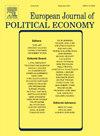欧佩克/中东和北非/阿拉伯的关系和缺失的民主转型
IF 2.4
3区 经济学
Q2 ECONOMICS
引用次数: 0
摘要
正如其他地方分析的那样,在数据中,民主转型是一个强有力的关系。本文讨论的是唯一的大例外:欧佩克/中东和北非/阿拉伯关系中的26个国家没有民主转型。解释是复杂的,因为它需要(至少)两个相互交织的理论:石油理论(欧佩克)和制度基因理论(中东和北非)。超过一半的欧佩克和中东和北非国家重叠,此外,除了两个中东和北非国家外,其他国家都是阿拉伯国家,具有相似的语言、宗教、历史和文化,从而产生了空间效应。本文试图理清和检验这两种理论,并证明这两种理论都是必要的,因此,欧佩克和中东和北非地区的重叠国家尤其远离民主。本文章由计算机程序翻译,如有差异,请以英文原文为准。
The OPEC/MENA/Arab nexus and the missing democratic transition
The democratic transition is a strong relation in the data, as analyzed elsewhere. This paper deals with the only large exception: The 26 countries in the OPEC/MENA/Arab nexus have no democratic transition. The explanation is complex as it requires (at least) two intertwined theories: The oil theory (for OPEC) and the institutional genes theory (for MENA). More than half of the OPEC and MENA groups overlap, and in addition all but two of the MENA countries are Arab, with similar language, religion, history, and culture, giving spatial effects. The paper is an attempt to untangle and test the theories, and demonstrate that both theories are needed, hence the overlapping countries that are both OPEC and MENA are especially far from democracy.
求助全文
通过发布文献求助,成功后即可免费获取论文全文。
去求助
来源期刊

European Journal of Political Economy
Multiple-
CiteScore
3.40
自引率
10.00%
发文量
106
期刊介绍:
The aim of the European Journal of Political Economy is to disseminate original theoretical and empirical research on economic phenomena within a scope that encompasses collective decision making, political behavior, and the role of institutions. Contributions are invited from the international community of researchers. Manuscripts must be published in English. Starting 2008, the European Journal of Political Economy is indexed in the Social Sciences Citation Index published by Thomson Scientific (formerly ISI).
 求助内容:
求助内容: 应助结果提醒方式:
应助结果提醒方式:


